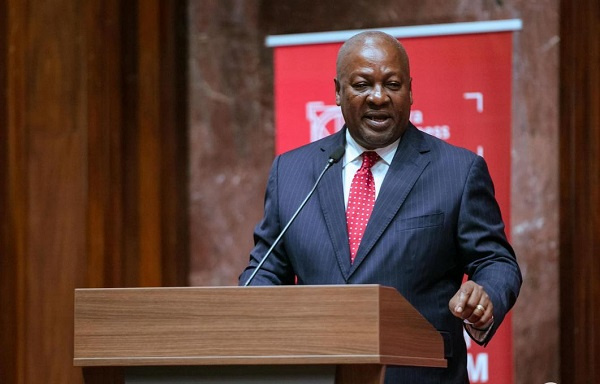Former president John Dramani Mahama promised in 2015 to undertake processes leading to the scrapping of controversial ex-gratia; lump sum payments to senior officials in the three arms of government.
At the time, the then president called for the support of organized labour to help achieve that aim at a time the payments were becoming increasingly unpopular and drawing public critique.
Between 2015 and early 2017 when Mahama left office after failing in his re-election bid, he could not see through his promise to scrap ex-gratia.
Eight years on, Mahama has pledged again to scrap the payments if he is voted into office in the 2024 General Elections.
Mahama in the latest pledge said his government will start the constitutional processes to scrap ex-gratia in the first year of his administration.
The former president, who made these remarks at the launch of his campaign to become the flagbearer of the NDC on Thursday, March 2, 2023, added that his government would also work to scrap ex-gratia benefits given to appointees under the other arms of government.
“The payment of ex-gratia to members of the executive under Article 71 will be scrapped. And the necessary constitutional steps to abolish that payment will start in earnest in 2025.
“We will also begin the process of persuading the other arms of government other than the executive to accept the removal of this ex-gratia payment,” he said.
Citi Fm story in 2015 of Mahama’s ex-gratia scrap plans
Emoluments for Article 71 office holders to be abolished
President John Mahama has charged organized labour to support government abolish ex-gratia for Article 71office holders.
President John Mahama has called on Organized Labour to support government’s decision to abolish emoluments for Article 71 office holders.
The President explained that the abolishment will pave way for a more efficient independent commission that will be fair to all workers notwithstanding their categories.
He said the state cannot continue to pay the current salaries for Article 71 office holders due to the pressure on the public purse.
Article 71 office holders include the President, the Vice-President, the Speaker of Parliament, the Chief Justice and Justices of the Supreme Court.
The rest are Members of Parliament (MPs), Ministers of State, political appointees and public servants with salaries charged to the Consolidated Fund but enjoying special constitutional privileges.
Article 71 (1) and (2) of the 1992 Constitution stipulates that the determination of the salaries and allowances of the Executive, the Legislature and the Judiciary paid from the Consolidated Fund would be determined by the President, on the recommendations of a committee of not more than five persons appointed by him and acting upon the advice of the Council of State.
In determining the salaries of the President, his Ministers and political appointees, as well as the members of the Council of State, the Constitution states that Parliament will determine that based on the advice of the same committee.
In November 2012, Parliament was tasked to review the salaries and emoluments approved by the House for Members of the Executive. The President called for closer collaboration between Labour and government to work push for the reforms.
President Mahama, who revealed this at the 2nd national forum on the Single Spine Pay Policy in Takoradi on Friday, asked for labour’s help to reduce the wage bill.
He said: “My colleague Kofi Asamoah [TUC General Secretary] has always maintained that labour alone is not responsible for this high wage bill. He says ghosts and Article 71 office holders contribute to the high wage bill.”
“I will ask him and Labour to join us push forward the constitutional reforms in which one of the reforms is to abolish Article 71 and replace it with an efficient Independent emolument commission,” he said.
The President was hopeful Labour and government will be able to implement the reforms to ensure workers are remunerated accordingly.
Source: ghanaweb.com




